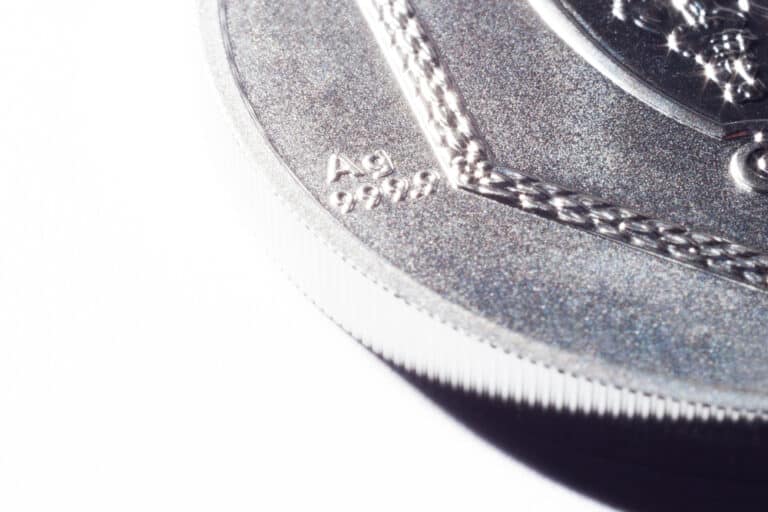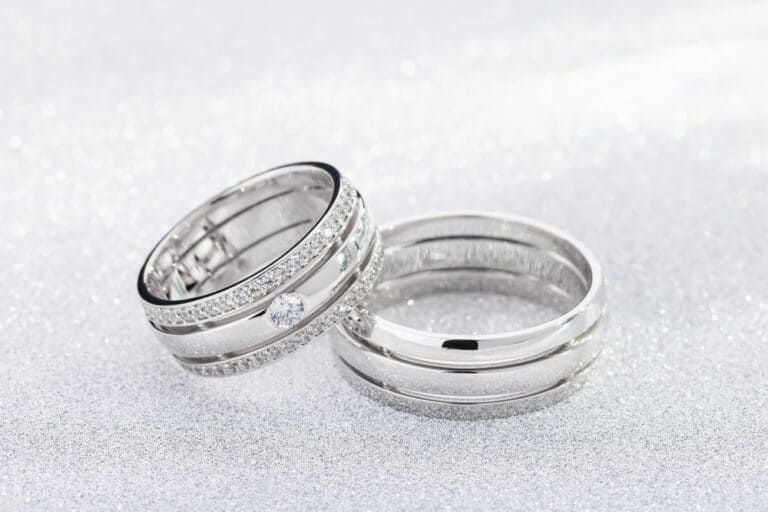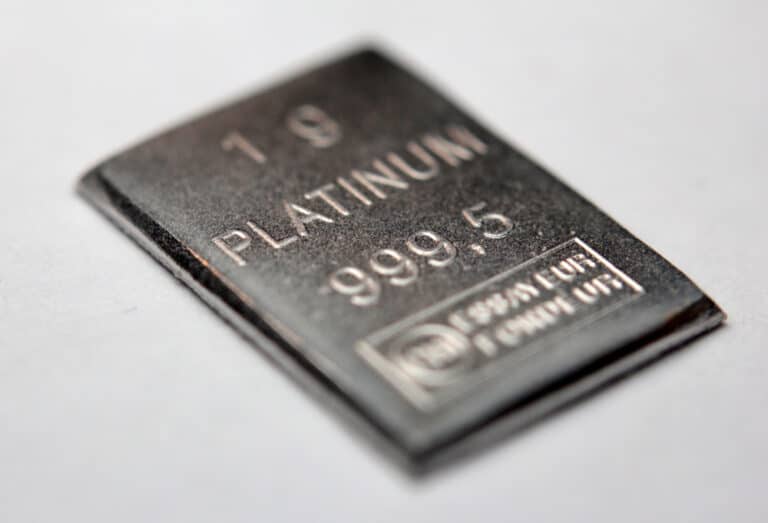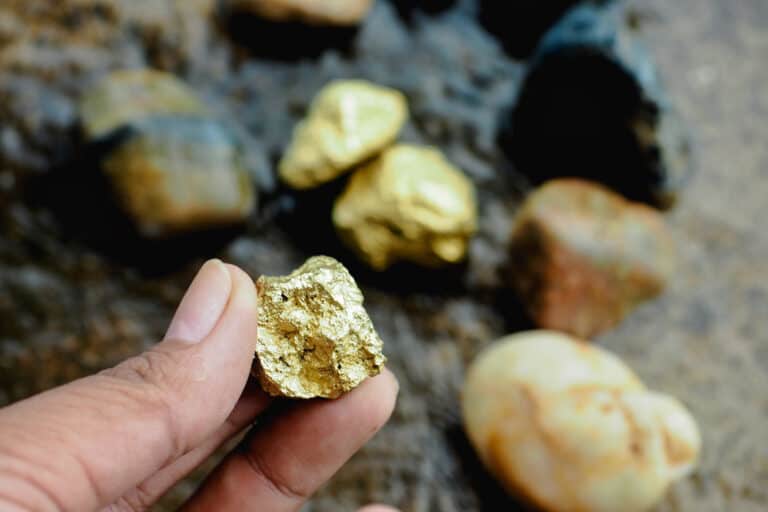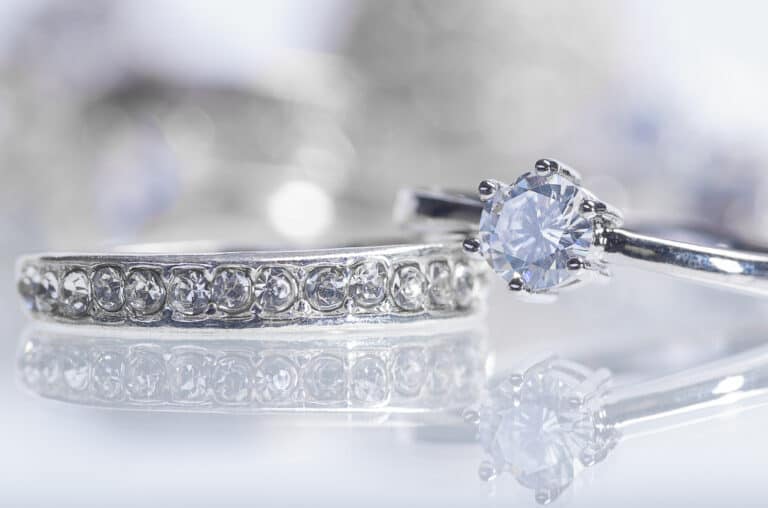Many of us have a favorite piece of jewelry that we wear daily. It may be an item with sentimental value, such as a friendship bracelet or an item given to us by a valued family member. Often we never take it off, even when we bathe or shower, but should we be wearing our silver in the shower?
Silver is water-resistant, and showering in chemical-free water will not damage it. However, prolonged exposure to water increases the rate at which silver oxidizes, causing silver to tarnish faster. If the water has high levels of chemicals such as chlorine, it will be detrimental to silver.
Another factor to consider when you decide whether to shower with your silver jewelry is if there are any gemstones in the piece that may get damaged by water. You may also want to check if there are any smaller areas where water could get trapped. The water in pools, oceans and hot tubs should be avoided altogether.
Factors To Consider Before Showering With Silver Jewelry
Pure water with no added chemicals will not be detrimental to your silver jewelry since this metal is water-resistant. It will, however, increase the reaction rate at which your silver oxidizes, causing the silver to tarnish faster. While tarnish is not damaging to silver, it can make your jewelry duller and potentially be hard to clean off, depending on how much tarnish has developed.
Because pure silver is very soft, it is often mixed with other metals to make it stronger. Sterling silver, for instance, also contains a small amount of copper, which tends to oxidize in water. Therefore, you should consider any other metal alloys that may be present in your silver jewelry.
The water in our shower almost always contains other chemicals, such as chlorine, which will also contribute to the rate at which the silver tarnishes. In addition, the chlorine will cause damage to your silver jewelry over time. Since the water we shower with tends to have lower levels of chlorine, the risk of harm is lower, especially if we do not expose the silver to it for too long.
If your silver jewelry has any areas in which water may become trapped, or areas where it may not be possible to dry it, it may not be good for you to shower with it. The longer your jewelry is exposed to the water, the faster the jewelry piece will tarnish, and it may also prove difficult, if not impossible, to remove the tarnish from such small areas.
Another consideration when deciding whether to shower with your silver jewelry is any gemstones or precious stones that may be present in the piece. As with silver, many gemstones do not get damaged by pure water. However, if there are other chemicals in the water, it may potentially be damaging. The chemicals contained in our shampoos or soaps may also cause damage.
Therefore, if your silver jewelry has any gemstones, it would be good to research the specific gemstone to determine if it is safe to shower with it. If your silver jewelry has any organic gemstones, such as pearls or amber, they will get damaged by the chemicals in your shower products.
Preventing Damage To Silver Jewelry When Showering With It
If you decide to shower with your silver jewelry, it would be good to limit the time your jewelry is exposed to the water as much as possible. Since high water temperatures speed up the rate at which silver tarnishes, it would be good to try to shower in water that is as cool as possible. Experts also recommend drying your jewelry as well as you can when you get out of the shower.
To prevent a build-up of soap, you should ensure that you rinse your silver jewelry well before getting out of the shower. To avoid your jewelry from getting dull over time from any soap that may have stayed behind, it would also be good to clean your silver jewelry regularly with a polishing cloth, a specially formulated cleaning solution, or a silver polish.
Water Types That Are Damaging To Silver Jewelry
While showering with your silver jewelry does not pose a significant risk to it, there are instances where wearing silver in water can be detrimental. Swimming pools, for example, usually contain high levels of chlorine. It would be good to remove your silver jewelry before getting in, especially if you plan on being in the pool for a long time.
You may also want to avoid wearing your silver jewelry in a hot tub, as the water often contains even more chlorine than in swimming pools. The high temperature of the water will increase the reaction rate between the silver and chlorine, causing damage to occur even faster. Another source of hot water to avoid is hot springs, which usually contain minerals such as Sulfur, which oxidizes silver.
It will also be good to avoid wearing silver jewelry when swimming in the ocean, as the salt in this water is corrosive and can cause a residue build-up on the jewelry that may be hard to remove. If you swim with your silver jewelry, experts recommend drying and cleaning it properly when you get out of the water.
How To Clean Tarnish From Your Silver Jewelry
Most experts recommend using a soft jewelry cleaning cloth to clean your silver jewelry. It would be good to avoid rubbing your jewelry too hard, as it may potentially cause damage. If you cannot get the tarnish removed with a cloth only, experts recommend using either a cleaning solution or polish explicitly formulated for silver. It is essential to follow the product instructions carefully.
It will also be good to be careful when doing online research about cleaning your silver jewelry, as some of the online advice may not come from a good source and can damage your jewelry. It is best to instead seek advice from knowledgeable professionals rather than just trying everything you can find online.
Therefore, if the tarnish on your silver is severe and you cannot get it off using the methods and products mentioned above, it may be best to take it to a professional jeweler or metals conservator to clean it. It may be costly to take it to a professional, but it will help prolong the life of your piece.

Conclusion
Although silver is water-resistant, it can get damaged if there are chemicals in the water, such as chlorine. Although our shower water tends to have lower levels of chemicals, water does increase the rate at which silver oxidizes, causing tarnish to develop faster. Any gemstones that may be present in the piece may also get damaged.
Therefore, while it is generally safe, it is not recommended to shower with your silver jewelry. If you shower with it, keep the water temperature low, rinse the jewelry well, and dry it off when you get out. Also, be sure to clean your silver jewelry regularly.
References
- https://www.quora.com/Can-you-wear-sterling-silver-in-water
- https://www.quora.com/How-do-I-clean-my-silver-jewelry
- https://www.quora.com/What-is-the-difference-between-silver-and-sterling-silver
- https://sciencing.com/effects-oxidation-copper-8613905.html
- https://www.thehairpin.com/2013/03/ask-a-jeweler/

